For startups, the cost of managing inventory is one of the most important expenses for their business. Keeping stocks beyond the actual amount of orders can potentially lead to stock issues. Meanwhile, not having enough stocks for high-selling products can lead to losses. As such, you need inventory management software to sell products and turn a profit while keeping costs down.
In this article, learn all about the top solutions in the market today. You can get a glimpse of the overview, price range, and features of different inventory management software for startups so you can evaluate your options. This will hopefully help you in ultimately deciding which software to go for.

What are the 10 best inventory management software for startups?
For startups, having a healthy cash flow involves managing their inventory efficiently. Otherwise, it will lead to wasted expenses that will impact their bottom line. Most businesses spend 25% to 35% of their operational budget on inventory management. However, 43% of companies do not have an efficient inventory tracking process that makes use of modern technology. This is just one of the common inventory management mistakes your startup should avoid.
Emerging Supply Chain Technologies for 2022
Source: Supply & Demand Chain Executive, 2022
Designed byThe good news is that such technologies are already available in the market today and are slowly gaining acceptance. According to a supply chain industry report, industry experts noted the emergence of robotics technology as a way to achieve real-time visibility into inventory. In 2021, robotics made up 32% of warehouse automation’s new product launches from integrators. On the other hand, software solutions comprised 19%.
By 2030, mobile robots are projected to make up over 30% of all warehouse automation equipment sales. For instance, revenue from the sales of piece-picking robots is expected to hit $1.3 billion in 2025. Such technologies, coupled with the leading inventory management software for startups below, can help you build the foundations of an orderly inventory management process for your startup.
What are the key features to look for in inventory management software for startups?
When selecting inventory management software for a startup, choosing a solution that can scale as your business grows and offers the functionality needed to optimize operations is crucial. Here are some key features to look for:
- Real-Time Inventory Tracking: Real-time tracking provides up-to-date information about stock levels, sales, and product movement. This feature helps prevent overstocking and understocking, which can disrupt business operations.
- Barcode Scanning and Integration: Barcode scanning can drastically reduce human errors and speed up inventory checks. A system that supports barcode scanning or integrates easily with barcode labels can save time and improve accuracy.
- Multi-Location Management: Startups with more than one warehouse or retail location need software to manage stock levels across various locations. This ensures that inventory data remains synchronized, reducing the risk of miscommunication or lost items.
- Automated Reordering: Inventory management software automatically generates reorders based on pre-set thresholds, which can help avoid stockouts. Automation reduces the time spent on manual inventory management and increases efficiency.
- Reporting and Analytics: The ability to generate detailed reports on inventory trends, sales data, and stock movement allows startups to make data-driven decisions. Look for software that provides customizable reporting options to suit your specific needs.
- Integration with Other Tools: To streamline processes, your inventory software should integrate seamlessly with other business systems, such as accounting, eCommerce platforms, and customer relationship management (CRM) tools.
List of Inventory Management Software for Startups
1. NetSuite ERP
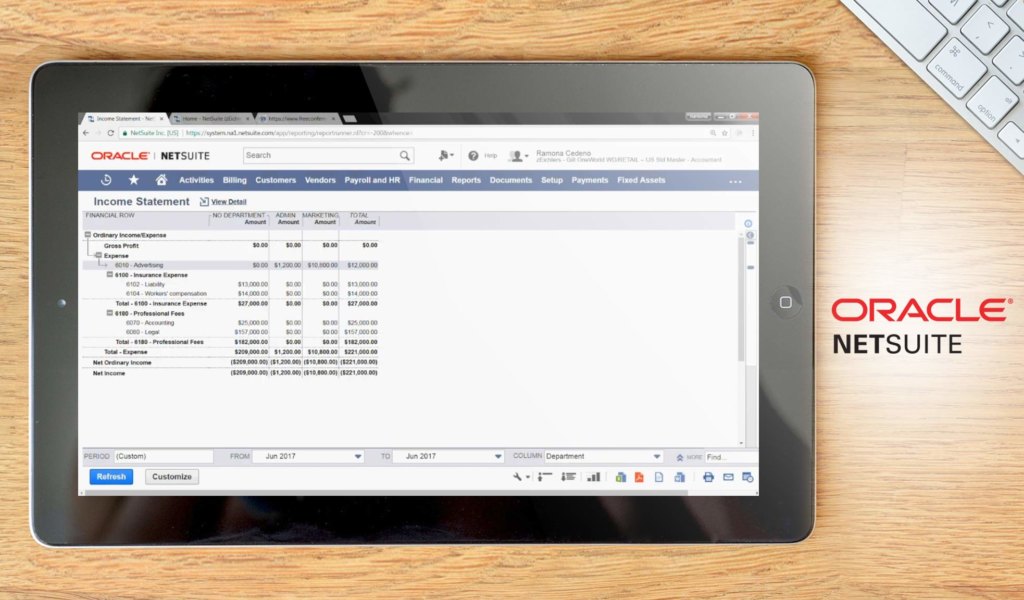
NetSuite ERP is a comprehensive cloud management solution that includes an inventory management module. The tool helps businesses to gain complete control of their full inventory lifecycle while reducing costs and keeping customers happy. NetSuite ERP can be used to meet the inventory management needs of pre-revenue startups to fast-growing businesses. It can be used in a wide range of industries, including retail, manufacturing, and healthcare.
NetSuite’s inventory management module includes a dashboard that gives users a real-time view of their inventory. With automated inventory tracking, they don’t need to rely on spreadsheets anymore. Real-time alerts notify users when stocks fall below a certain threshold. Netsuite can be integrated with Salesforce, Google Apps, and more, as well as through direct-to-API integration.
Price Range: Inventory management is included with a Netsuite platform license. Subscribers pay an annual license fee and a one-time implementation fee. Price is available upon request from the vendor.
What is unique about NetSuite ERP?
- Multi-location fulfillment. NetSuite ERP helps you avoid multiple shipments and extra shipping charges through predefined fulfillment rules. You can see stock levels across all locations and transfer inventory from one location to another to make sure you have enough inventory available.
- Replenishment. NetSuite helps you ensure that you have enough stocks at hand by looking at historical and seasonal sales data, average lead time, and the number of inventory days of supply. It then dynamically handles item reorder points and generates tasks for the purchasing manager.
- Cycle Counting. The software ensures that your inventory count is accurate through regularly scheduled counts of on-hand quantities. It can do this for select SKUs so the inventory count can be included in everyday tasks.
- Traceability. NetSuite lets you track inventory through lot and serial numbers as well as bin management. These help you reduce waste and simplify inventory management.
- NetSuite Advanced Inventory. This product features demand-based inventory as well as inventory control and process management.
Detailed NetSuite ERP Review
2. monday.com

monday.com is a cloud-based open platform that allows you to build the tools you need to manage your work. It features apps, boards, documents, dashboards, multiple views, and automations that serve as building blocks for creating your workflows. With monday.com, teams can become more efficient and productive and stay aligned with their goals.
Inventory tracking is one of the workflows you can set up using monday.com. It allows small and medium businesses as well as enterprises to track stocks from the point of collection until final delivery. By automating the process, you can receive notifications about the status of your inventory. monday.com can be integrated with Slack, Dropbox, Adobe Creative Cloud, and more to further streamline your process.
Price Range: monday.com offers a free-forever Individual plan. Its paid plans range from $8 to $16 per seat per month. It also have a quote-based Enterprise plan.
What is unique about monday.com?
- Boards. With the Boards feature, you can visualize your inventory process, complete with graphs, shapes, colors, and other elements. Choose the board view to see information in a single aspect and dashboard for a more comprehensive view of your data.
- Customizable templates. Monday.com offers templates for manufacturing and operations so you don’t have to start from scratch. They also have documents that you can turn into action items and connect with your workflows.
- QR code inventory tracking. With monday.com, you can use your mobile phone to create a QR code or scan one. This allows you to track the status of your items and update them even if you are out and about.
- Inventory automation. With monday.com, you can automate your inventory process even if you don’t know how to code. You can build your own automated workflows using triggers or use pre-set automation recipes.
- Workdocs Function. With this feature, you and your team can collaborate in real-time. You can embed various types of files on your document and the changes will be synced as you work.
Detailed monday.com Review
3. ShipBob
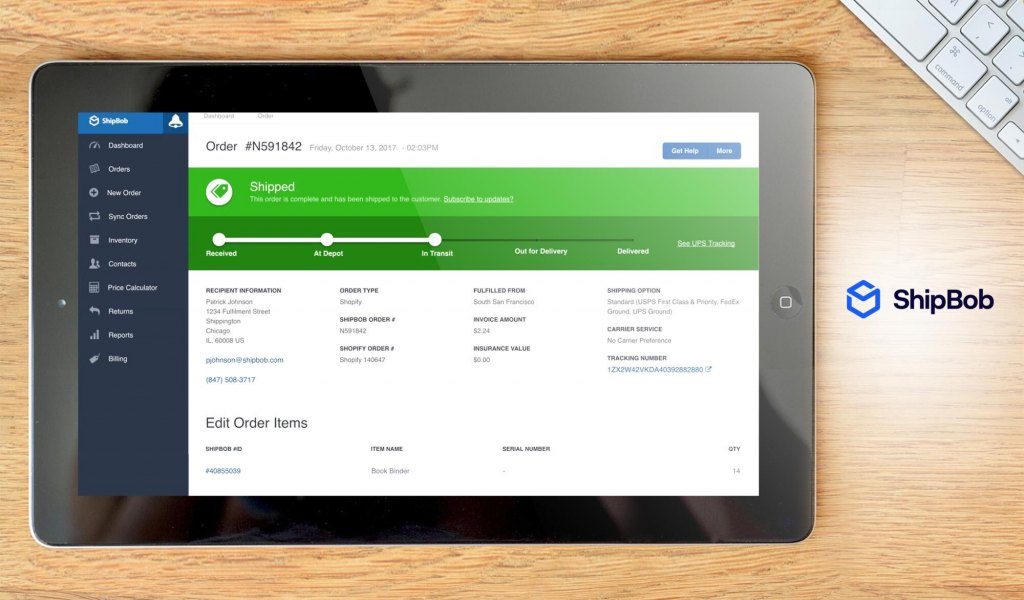
ShipBob is a logistics solution that helps ecommerce businesses and direct-to-consumer brands to fulfill their orders anywhere in the world. With ShipBob, increase average order value, lower cart abandon rates, and save your team from hours of work. Various customers have used ShipBob to grow their business, including those that sell cosmetics, custom gifts, crafting supplies, and more.
With ShipBob, businesses can fulfill orders in three easy steps. First, they connect their store to ShipBob, then store inventory in their fulfillment centers. ShipBob will then ship the order from the nearest fulfillment center. Its web-based fulfillment software allows you to manage orders and track stock levels in real-time. To further enhance its capabilities, ShipBob can be integrated with Wix, Shopify, WooCommerce, and BigCommerce.
Price Range: ShipBob offers the Growth Plan for merchants shipping less than 400 orders per month. Receiving costs start at $25 per inbound shipment range from $5 to $40 per month per bin depending on the dimensions. They also offer quote-based plans available upon request from the vendor.
What is unique about ShipBob?
- Onboarding services. ShipBob’s implementation team assists customers with onboarding. They can set up shipping options, sync the software to your online tool, and more.
- Distributed inventory. ShipBob helps customers ship products at affordable rates with its network of fulfillment centers. Keeping inventory near customers lets you reduce shipping zones and costs.
- Two-day Express Shipping Program. ShipBob offers two-day express shipping for all orders in continental United States. placed in any of its ecommerce integrations. The tool’s proprietary algorithm uses a mix of air, ground, and regional carriers so you can enjoy high on-time delivery rates.
- Reporting and analytics. ShipBob’s free analytics tool lets you access various kinds of reports such as shipping cost, days in transit, fulfillment cost per order, and more. Reports are presented in easy-to-understand charts to aid you in decision-making.
- End-to-end customer experience. ShipBob provides you with the support for your customers to have an outstanding customer experience. From tracking to product packaging and return management, it offers options so you can meet customer expectations.
Detailed ShipBob Review
4. GEP NEXXE
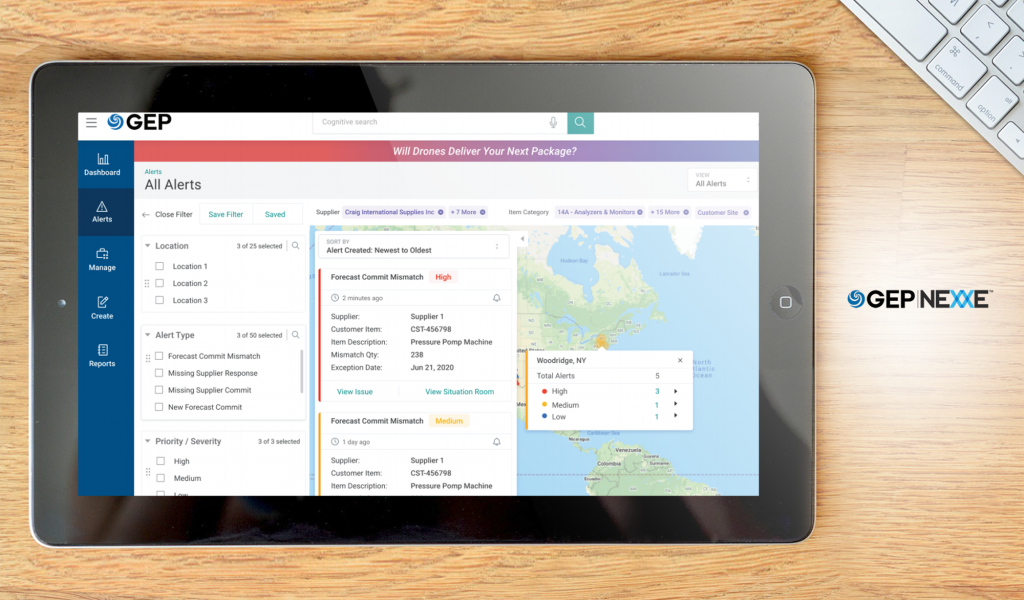
GEP NEXXE is an end-to-end supply chain platform that helps companies meet the demands of complex, global supply chains. This comprehensive solution enables business planning, enhances real-time collaboration, and gives you a clear picture of your supply chain. GEP NEXXE can be used in various industries, such as financial services, energy and utilities, industrial manufacturing, and more.
GEP NEXXE is powered by GEP MINERVA, the vendor’s proprietary AI technology, which enables it to predict outcomes and recommend business actions. Recent ERP statistics reveal that around 34% implement ERP solutions to shift away from legacy systems. In this regard, GEP NEXXE can help. It is hosted on Microsoft Azure, giving it the flexibility to be integrated with your legacy ERP system. With this, you can maximize the full potential of your data so you can enhance planning and productivity, as well as speed up implementation cycles.
Price Range: GEP NEXXE offers a quote-based plan. It can send a business proposal based on your industry and company revenue upon request.
What is unique about GEP NEXXE?
- Supply chain collaboration. GEP NEXXE’s AI-powered capabilities enable users to coordinate demand forecasts, purchase orders, and manufacturing capacity. The tool features a real-time collaboration with various trading partners, whether they are tier 2 suppliers, channel partners, or resellers.
- Supply chain visibility. According to the latest supply chain trends, 62% of organizations have limited visibility. With GEP NEXXE, you can get a real-time snapshot of raw materials, components, and finished goods. Telematics and RFID support for packages and containers gives you information about demurrage, wait time, and expected arrival time.
- Supply chain execution. GEP NEXXE gives you end-to-end visibility over your supply chain, which enables the system to make automated replenishment suggestions. It also features predictive alerting so you can recalibrate your plans as conditions change.
- Demand planning. GEP NEXXE uses real-time market data together with point-of-sale data for automated demand sensing. You can delve into various factors and trends to ensure the accuracy of your forecasts.
- Supply planning. With GEP NEXXE, you can create your ideal supply plan that considers material and capacity limits versus your demand plan. You can also prioritize demand based on your company goals.
Detailed GEP NEXXE Review
5. ShipHero
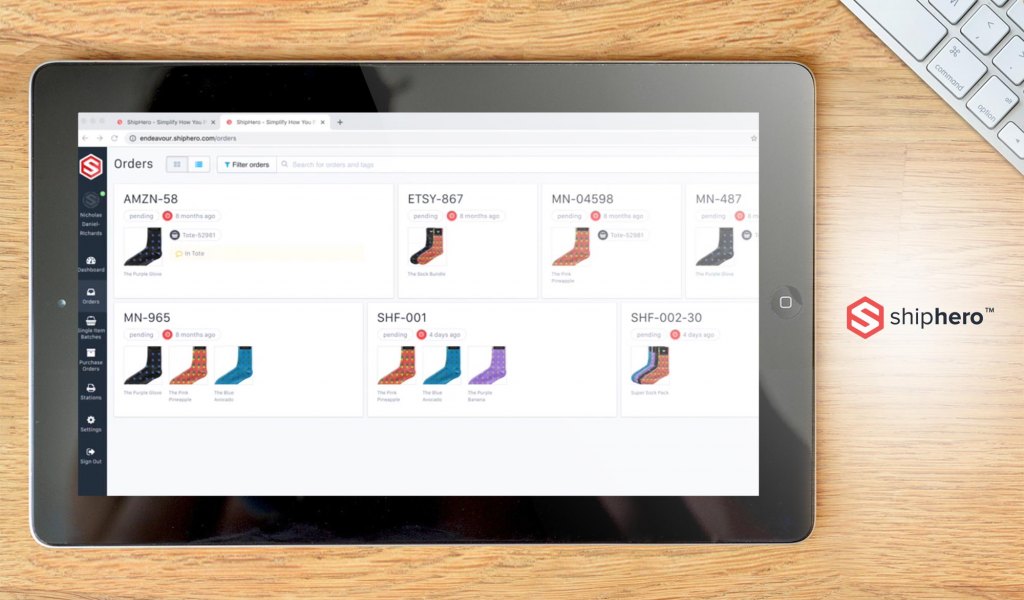
ShipHero is an ecommerce fulfillment software that allows online brands to manage their end-to-end shipping process. With ShipHero, ecommerce brands can manage their warehouse inventory with ease, process orders accurately and efficiently, and make sound business decisions. ShipHero has helped ecommerce brands and third-party logistics providers dramatically reduce mis-ships, mis-picks, and warehouse costs, as well as to increase picking efficiency.
With ShipHero’s inventory management software, you can get started in three easy steps. First, connect your online storefront to the software. You can then proceed to pick, pack, and ship your orders. Third, you can review warehouse data through a customized Hero Board. ShipHero offers direct integration with popular ecommerce platforms like BigCommerce, Magento 2, MyStore No, Shopify, and WooCommerce. With online sales expected to grow as per the latest ecommerce trends, integrating inventory software with ecommerce platforms will prove to be wise.
Price Range: ShipHero offers Essential WMS for Brands at $499 per month and Standard WMS for Brands at $1,850 per month. They also offer Enterprise WMS for Brands, which is a quote-based plan.
What is unique about ShipHero?
- Automation rules. With automation rules, you can create triggers that will result in an action. Examples include sending an email for an order with a certain SKU, helping you conserve time and energy.
- ShipHero Mobile. In just a few clicks, you can move inventory from your Apple tablet or mobile phone. All you have to do is search by location, select the product type and amount, and select the location where you want to move your inventory.
- Returns. With ShipHero, ecommerce brands can customize return settings such as return options, minimum return values, flat rate return shipping costs, and more. It also provides customers with a customer return portal that brands can implement in their online storefronts.
- Is Virtual. With this feature, you can set up the availability of products or digital downloads to be manufactured based on the number of orders received. Setting the SKU of a product to Is Virtual enables you to provide unlimited availability of the product.
- Replenishment notifications. Replenishment notifications make it easy for you to know when you need to create a purchase order. It also allows you to set reorder levels if you want to be notified when a product hits below a set certain amount of units.
Detailed ShipHero Review
6. ManagerPlus
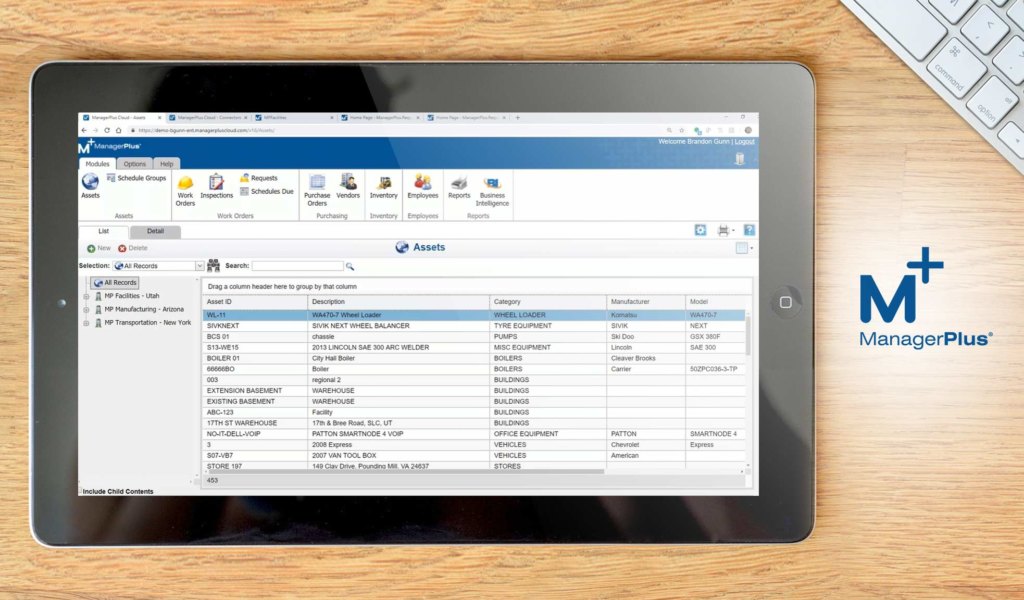
ManagerPlus is a manufacturing equipment management software that enables businesses to maximize their assets and optimize maintenance workflows. With the solution, asset and equipment cost centers transform into profit centers. ManagerPlus helps businesses grow their bottom line by auditing their inventory, eliminating unneeded carrying costs, and reducing unplanned downtime. This solution can be used in various types of industries, such as construction, manufacturing, government, and agribusiness.
One of the many features of ManagerPlus is inventory management. With its just-in-time philosophy, you are assured that you will always have the right parts in the right place at the right time. ManagerPlus can be integrated with a host of third-party tracking systems. It is also built on an open API for building integration with other apps.
Price Range: ManagerPlus offers two plans: Lightning Plus charged at $85 per user month, and Lighting Experience charged at $125 per user per month.
What is unique about ManagerPlus?
- Inventory planning. With ManagerPlus, you can configure inventory par levels so you can receive alerts when it’s time to order again. You can track where parts are going so you can predict with precision the parts you need.
- Reporting. ManagerPlus allows you to stay on top of your maintenance, repair, and operations. Business intelligence reports are available so you can make data-driven decisions to minimize costs and maximize inventory.
- Vendor management software. Managing all your vendors is easy with a central repository for keeping supplier information. From there, you can also complete purchase orders and let select vendors receive PMs when you require customized work to be completed.
- Mobile app. ManagerPlus comes with a mobile app that helps technicians while they are on the field. With the app, they can mark assets that failed inspection, and then automatically generate a work order with the correct parts.
- Computerized maintenance management. Having your inventory managed from a computerized management system allows you to have visibility into all aspects of your maintenance operations. With this information, you can make the most out of your MRO inventory budget.
Detailed ManagerPlus Review
7. Shopventory
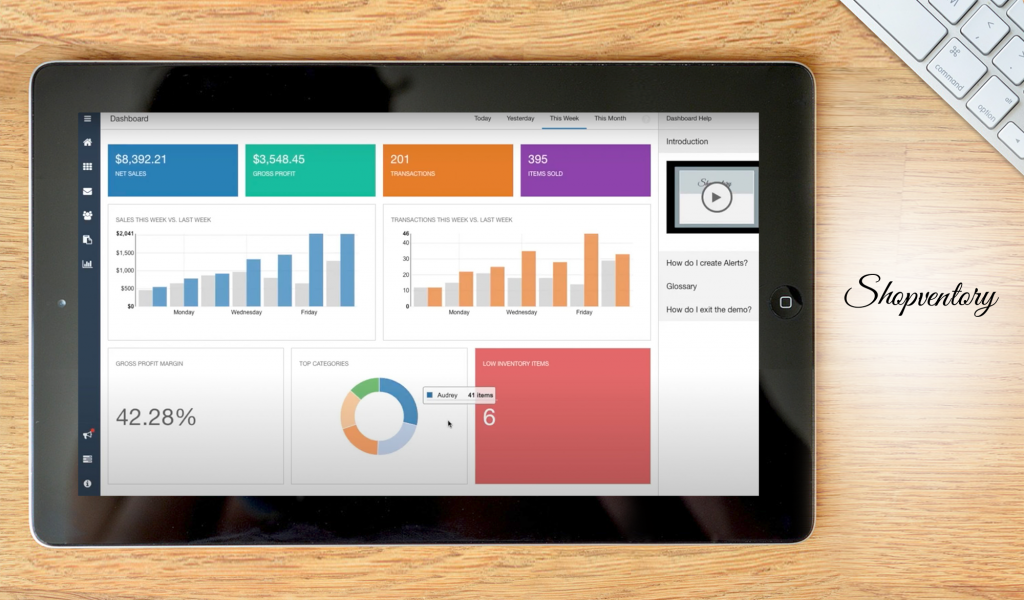
Shopventory is a real-time inventory management software for startups to help them manage and track their inventory with ease. With Shopventory, you can address inventory problems as they happen so you are always ready to give customers what they need. The solution can be deployed to manage the inventory of pubs, bars, cafes, restaurants, liquor stores, smoke shops, and coffee shops. It can also be used for custom and wholesale inventory management.
The software has a host of convenient features such as simplified vendor management, spreadsheet bulk upload, and purchase order creation. You can achieve seamless inventory management through integrating Shopventory with Square, Clover, Shopify, BigCommerce, WooCommerce, and PayPal Here. To manage inventory on the go, Shopventory has a dashboard app for Apple and Android devices.
Price Range: Shopventory offers four plans: Standard ($79 per month), Professional ($199 per month), Elite ($399 per month), and Enterprise ($799 per month).
What is unique about Shopventory?
- Sales reports from Alexa. With Shopventory, you can do inventory management through your voice. With this feature, you can access sales summaries and get sales updates for specific locations.
- Alerts and PAR levels. Shopventory allows you to set up condition-based alerts so you can be alerted when your inventory gets low. You can also create an unlimited amount of alerts and delete those that you no longer need.
- Recipes and bundles. The tool features ingredient- and component-level tracking so you can accurately mix and match products. You can also use partial quantities or carry alternate versions of an item.
- Scan-to-count cycle counts. Save time and effort while ensuring inventory accuracy by doing your cycle count in batches. In this way, you don’t have to shut down your store to do your inventory.
- Modifier inventory tracking. With this feature, you can track and customize product components at the point of sale. You can configure substitutions or modifications in the system for each final product.
Detailed Shopventory Review
8. Katana
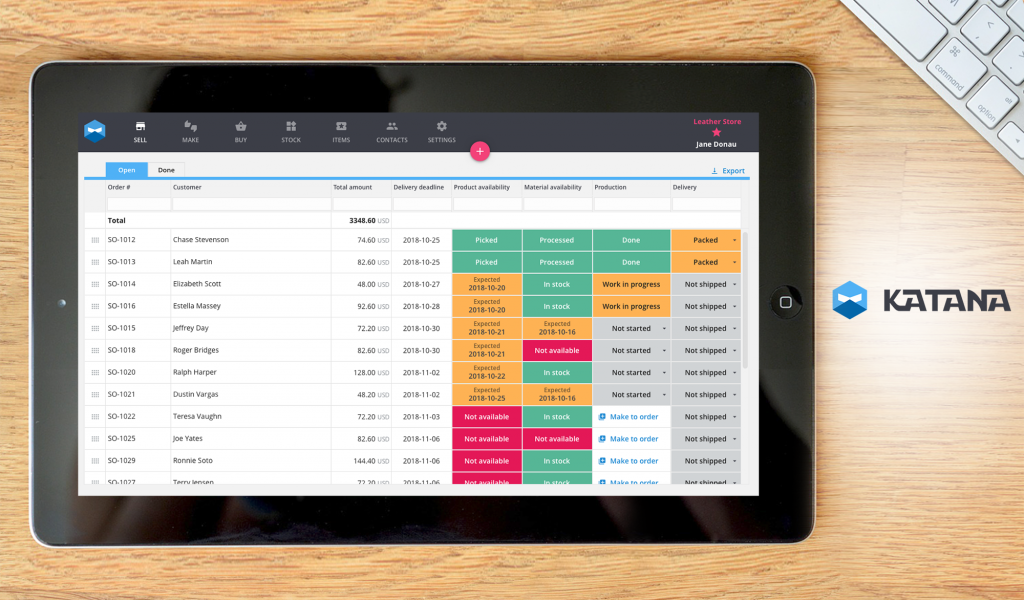
Katana is a manufacturing ERP software that gives you a real-time view of your business so you get the date you need to make decisions. With Katana, manufacturers can boost productivity, lessen implementation time, and improve customer satisfaction. Katana can be used in a wide range of products, including the manufacturing of roast coffee, health and beauty products, food and beverage products, custom arts and crafts, home and garden tools, and more.
This powerful software is packed with features that help you and your team move products in your inventory. These include live order management, real-time master planning, total shop floor control, and more. Katana can be integrated with a wide range of apps such as Xero, Amazon, Shopify, WooCommerce, BigCommerce, and more.
Price Range: Katana offers an Essential plan billed at $99 per month billed annually or $129 per month billed monthly. They also have a Pro plan billed at $299 per month billed annually or $349 per month billed monthly.
What is unique about Katana?
- Live inventory management. Katana gives you a glimpse of your total inventory for raw materials and finished products so you avoid running out of stock. You can also track on-hand, committed, and expected stock amounts in real-time.
- Real-time master planning. With Katana, you can optimize all your key resources from one platform. You can make sure that inventory is kept at ideal levels at all times, and that production is prioritized based on what raw materials are available. This is especially important in light of recent supply chain statistics that indicate that 53% of businesses plan to dual-source raw materials.
- Shop floor control. Katana features a Shop Floor app to help you get sales and production in sync. This feature lets you easily assign and reassign jobs to keep up with the demands of production and track time spent on tasks for shop floor activities.
- Omnichannel order management. With Katana, you can manage both business-to-business and ecommerce sales management from one tool. Sales from multiple channels are synced into a dashboard to help you optimize order fulfillment.
- End-to-end traceability. Katana gives you the tools you need to monitor inventory beyond the warehouse. Batch tracking provides end-to-end traceability for materials while tracing faulty batches helps you with quality assurance.
Detailed Katana Review
9. Zoho Inventory

Zoho Inventory is an online inventory management for businesses based in the US. The tool integrates stock management, order fulfillment, and inventory control all under one roof. With Zoho Inventory, businesses can boost sales, manage online and offline orders, and implement end-to-end tracking of items. The solution can be used by manufacturers as well as online sellers in Amazon, Shopify, Etsy, and eBay.
Zoho’s cloud-based inventory solution allows users to have a centralized inventory where sales records from various channels are stored. Other helpful features include product listing, item kitting, automatic re-ordering, and more. Zoho Inventory natively integrates with Shopify, UPS, Aftership, UPS, USPS, and Zoho Commerce. Third-party integrations with other apps are also available through CartRover and EasyPost.
Price Range: Zoho Inventory offers a free plan with basic features. They also have four paid plans namely, Standard, Professional, and Premium. These range from $59 to $239 per organization per month billed annually or $79 to $299 per organization per month billed monthly.
What is unique about Zoho Inventory?
- Kitting/composite items. Zoho Inventory allows you to offer two or more items or services as one commodity. With this feature, you can bundle items together as one purchase or create a kit that can be tweaked according to customer preferences.
- Batch tracking. This feature allows you to group and check a set of stock with the same characteristics. With this, you get visibility into expiring items and defective items.
- Serial number tracking. Under this system, individual units of an item have a unique identification number. This will help you track items from the time they are created until they are sold.
- Bar code scanning. With this feature, you can lessen manual data entry, which is prone to human error. Bar code scanning allows you to check easily actual versus recorded stock, making the process faster.
- Inventory adjustments. Zoho Inventory allows you to accommodate scenarios where the quantity or value of your items change even without any sales or purchase transactions. These include a reduction in items due to mishandling during shipping.
Detailed Zoho Inventory Review
10. Ruby Has Fulfillment
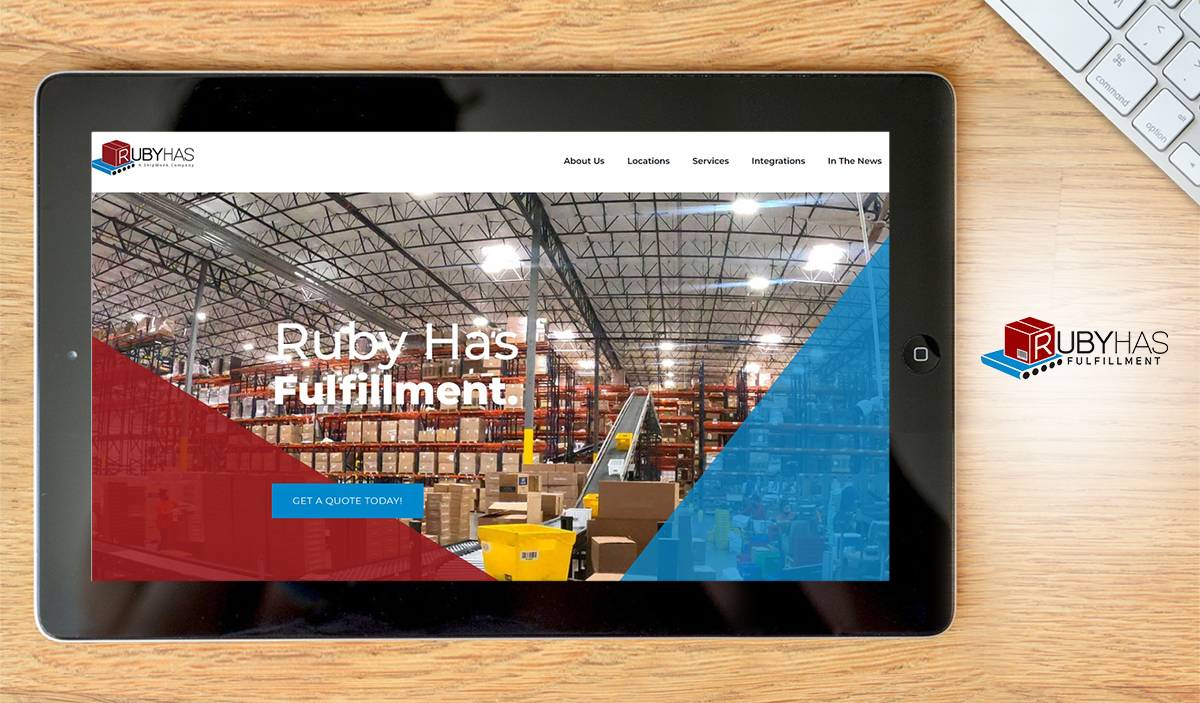
Ruby Has Fulfillment is an ecommerce fulfillment and third-party logistics (3PL) provider that enables ecommerce merchants to grow their business. Ruby Has Fulfillment offers an enhanced 3PL experience that features state-of-the-art technology that ensures inventory accuracy while providing real-time reporting. The software has been used by a direct-to-consumer brand, a global fashion brand, and a manufacturer of dairy products.
As a one-stop-shop for order fulfillment services, the vendor offers same-day fulfillment, same-day shipping, domestic customer care services, returns management, and more. They also employ digital systems such as automated sorting and RF scanners to speed up service. Ruby Has Fulfillment has forged relationships in its vast partner network, which covers key aspects of your business from online marketplaces to inventory to EDI apps. These include Shopify, Amazon, Magento, SAP, Microsoft, Netsuite, and more.
Price Range: The vendor offers quote-based pricing, which is available upon request to a fulfillment expert.
What is unique about Ruby Has Fulfillment?
- Same-day fulfillment. Ruby Has Fulfillment takes pride in offering same-day fulfillment from its warehouses. They have secure distribution centers in California, Ontario, Nevada, Kentucky, New Jersey, New York, and the United Kingdom.
- Same-day shipping. The vendor provides same-day shipping for orders received before 2 p.m. from all their warehouse locations. This helps to ensure fast delivery from their shipping centers.
- Pick & pack. Ruby Has promises to pick and pack each order from their fulfillment warehouses carefully and accurately. They do this through cutting-edge automation technology coupled with expert staff.
- Address validation. Orders go through a validation process where the addresses are verified during the fulfillment process. This helps ensure that orders are sent to the right address each time.
- Order and inventory management. Ruby Has Fulfillment puts in the effort to make sure that fulfillment items are received, stored, packed, and shipped with accuracy. For this reason, they have a 100% satisfaction guarantee to its clients and end-users for order fulfillment.
Detailed Ruby Has Fulfillment Review
Manage Supply Chain Disruption with the Right Software
The pandemic has disrupted the vast network of supply chains around the world. Executives have realized how changes to the supply chain can be a threat to their business. As such, it pays to know what inventory management software is, along with the features and benefits of using one.
One solution that stands out from the rest is NetSuite ERP. This comprehensive cloud-based solution allows you to handle inventory management as well as order management, supply chain management, and warehouse management from one platform. As such, it gives you visibility into your entire operations, which is important for startups.
Key Insights
- Importance of Inventory Management: Efficient inventory management is crucial for startups to maintain a healthy cash flow, avoid wasted expenses, and maximize profits.
- High Operational Costs: Inventory management can consume 25% to 35% of a startup’s operational budget, highlighting the need for efficient systems.
- Technological Integration: Only 43% of companies use modern technology for inventory tracking, underscoring the potential for significant improvements through technological adoption.
- Emerging Technologies: Robotics and software solutions are increasingly being integrated into warehouse automation, with significant growth expected by 2030.
- Top Solutions Available: The article lists ten leading inventory management software solutions for startups, each with unique features catering to various business needs.
FAQ
- Why is inventory management crucial for startups?
Inventory management is vital for startups as it helps maintain a healthy cash flow, prevents stockouts and overstock situations, and minimizes wasted expenses, thereby positively impacting the bottom line. - What are the common inventory management mistakes startups should avoid?
Startups should avoid relying on outdated manual tracking processes, overstocking or understocking products, and not leveraging modern technology for real-time inventory visibility and automation. - How does NetSuite ERP help with inventory management?
NetSuite ERP offers comprehensive inventory management with features like multi-location fulfillment, replenishment based on historical data, cycle counting, and traceability through lot and serial numbers, all integrated into a real-time dashboard. - What makes monday.com suitable for inventory management?
monday.com is highly customizable, allowing businesses to build specific workflows for inventory tracking. It offers features like QR code inventory tracking, inventory automation without coding, and integration with various tools like Slack and Dropbox. - How does ShipBob enhance inventory management for e-commerce businesses?
ShipBob provides a seamless logistics solution with distributed inventory across fulfillment centers, real-time inventory tracking, onboarding services, two-day express shipping, and detailed reporting and analytics to optimize order fulfillment. - What unique features does GEP NEXXE offer for supply chain management?
GEP NEXXE provides AI-powered supply chain collaboration, real-time visibility, automated replenishment suggestions, predictive alerting, and integrated demand and supply planning to enhance efficiency and decision-making in complex supply chains. - How does ShipHero improve the efficiency of e-commerce fulfillment?
ShipHero offers automation rules, a mobile app for inventory management, customizable return settings, and replenishment notifications. It integrates with major e-commerce platforms, making it ideal for streamlining end-to-end shipping processes. - What benefits does ManagerPlus provide for manufacturing businesses?
ManagerPlus enables efficient inventory planning, comprehensive reporting, centralized vendor management, mobile app support for field technicians, and computerized maintenance management, transforming asset and equipment management into profit centers. - Why should startups consider using Shopventory?
Shopventory offers real-time inventory tracking, sales reports via Alexa, condition-based alerts, ingredient-level tracking, and modifier inventory tracking. It integrates with major payment and e-commerce platforms, making it versatile for various business types. - What makes Katana a robust choice for manufacturers?
Katana offers live inventory management, real-time master planning, shop floor control, omnichannel order management, and end-to-end traceability. It integrates with several e-commerce platforms, providing comprehensive visibility and control over production and inventory. - How does Zoho Inventory support inventory management?
Zoho Inventory provides centralized inventory control, kitting/composite items, batch and serial number tracking, bar code scanning, and inventory adjustments. It integrates with various e-commerce and shipping platforms, enhancing efficiency and accuracy. - What unique services does Ruby Has Fulfillment offer?
Ruby Has Fulfillment provides same-day fulfillment and shipping, pick and pack services, address validation, and comprehensive order and inventory management. Their extensive partner network ensures smooth integration with various business aspects.


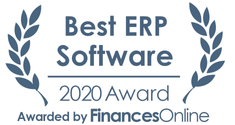















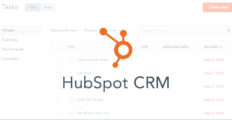









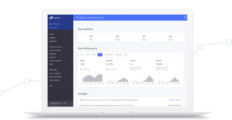
Leave a comment!